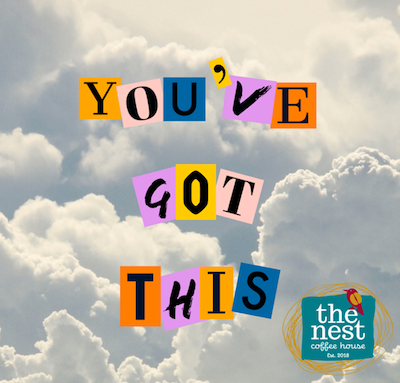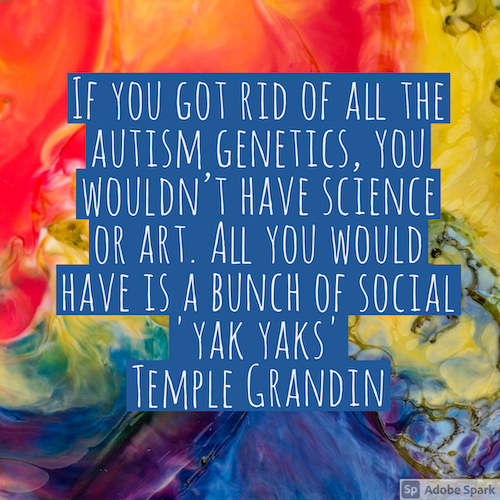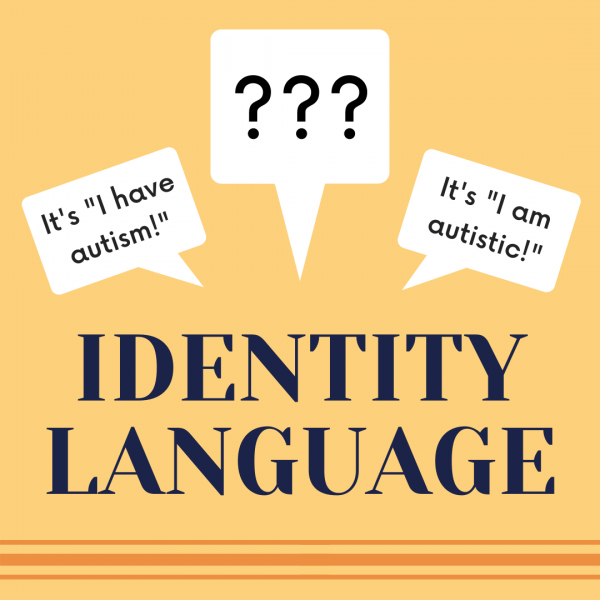
While the debate over the evolution of preferred language continues, it is important to remember that creating a more welcoming, accepting and inclusive world requires everyone to work together toward that common goal. What unites us is a passion for progress toward a world where neurodiversity is a common fact of life without barriers to independence, employment, social interactions and fulfillment. Just as preferred language has evolved for numerous other communities, so it will with autism and neurodiversity. Our job is to walk this road together respecting personal preferences.
From a blog post written by Eileen Lamb:
When it comes to Autism, no two autistics are alike.
Some can communicate, others can’t, and will never be able to.
Some can talk, but prefer to communicate nonverbally.
Some love to talk, while others are quiet.
Some prefer identity-first language, and others use person-first.
Some will live independently, and others require 24/7 care for life.
Some like the puzzle piece symbol, others don’t.
Some have impressive “splinter skill”, but most do not.
When it comes to autism, we all have different abilities and varied opinions.
There isn’t a single autistic voice, and there’s not a single form of autism. If you are looking to learn more about autism, have conversations with an autistic person, and then another, and then another.
But remember, some people with autism cannot communicate, whether verbal or otherwise. So, to get to know them, you might have to talk to the people closest to them, those who care for them and often will for their entire life.
—
A quote from Dr. Stephen Shore is a very powerful reminder of how unique and diverse autistic individuals are: “If you know one person with autism, you know one person with autism.”
Here are some tips for what to do when identity or person first language comes up in conversation:
There is a lot to learn and some of us are searching for info to help us actively understand . A Little Compassion and The Nest Coffee House we have you covered.
During the month of April we’ll be providing information and articles about how the Autism movement has evolved. Together we’ll work toward the common goal of understanding the gifts and struggles that come along with being autistic as well as how we can all actively be part of creating a dynamic, enriched, inclusive, diverse and kind community that is respectful and responsive to all.
Stay tuned and be ready to celebrate autism awareness AND neurodiversity with us all month
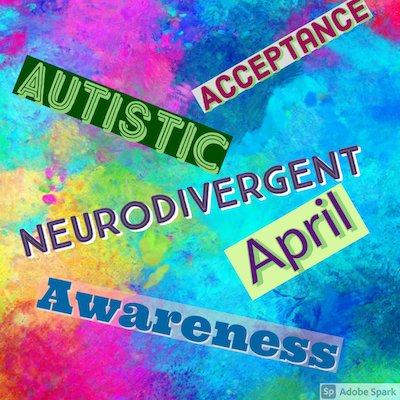
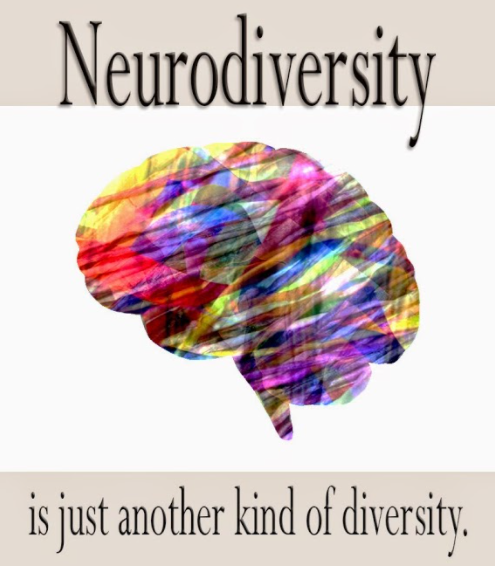
Neurodiversity is a concept that recognizes neurological differences as normal, natural human variation and encompasses a wide range of neurological differences. In addition to autism, these include ADHD, dyslexia, dyspraxia, dysgraphia and dyscalculia, Tourette’s Syndrome, and others. New research shows that approximately 1 in 5 human beings are neurodivergent. Acceptance acknowledges the diversity of minds, intelligences, abilities and differences that are all part of humanity. The use of a rainbow colored infinity symbol represents humankind’s infinite neurodiversity. It follows that neurocognitive difference should not be a barrier that excludes neurodivergent people from achieving their potential, contributing to society, and being afforded the same rights and protections under law as everyone else.
The fact that neurodiversity is a natural part of human variation doesn’t mean that the experience of neurodivergence is easy. Being neurodivergent in a world designed for the neurotypical – or more common – experience can present challenges, both in immediate and long-term ways.
A common experience of autistic people is that communication can be difficult, not just in speaking but also in writing, in gestures, actions, tone and pace of our voices. These experiences are also common among other neurodivergent people. Difficulty communicating can affect the ability to study, learn, and succeed in employment and relationships. In addition, neurodivergent people may require support with organization, planning and time-management.
So, what does acceptance look like? First and foremost, it means viewing autism and other forms of neurodiversity as a natural part of the human experience. It means valuing and celebrating differences and all of the perspectives, interests, creativity, passions, and talents these members of our community bring to our lives. And it means including and embracing them – all aspects of them – as we work together to create a better world. Afterall, if we all thought alike, the world would be a very different – and far less interesting – place!
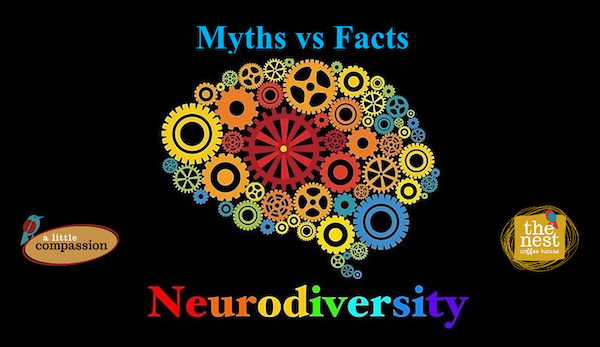
Neurodiversity refers to the infinite variability in the human brain. Our brains are as unique as our fingerprints. We are all born with different brain “wiring” that comes with its own benefits and challenges, strengths and disadvantages.
As science has shed new light on neurodiversity, our understanding of neurodivergence has evolved. The term “neurodiversity” was first used to describe the way autistic brains process information and view and interact with the world. It has become clear over time that there are other kinds of neurodivergent brains. As scientists continue to try to understand the impact of neurological differences, the list of conditions considered neurodivergent grows. Additional examples of neurodivergence include dyslexia, dyscalculia, epilepsy, hyperlexia, dyspraxia, ADHD, obsessive-compulsive disorder (OCD), and Tourette syndrome (TS) – and potentially many more, including being left-handed.
Fact: Autistic people and people with ADHD, OCD, Tourette’s Syndrome, and other neurodivergent conditions might have many things in common, but they are as individual as everyone else.
Neurodivergent people have distinct personalities that come with different interests and passions, likes and dislikes, and strengths and weaknesses. Some are social, some are not. Some excel at math, some do not. Some like to read fiction, others prefer science books. Some experience a great deal of anxiety and some do not. The important thing to know is that neurodivergent people are as varied as everyone else. Just because a label or diagnosis may be similar, it cannot tell what strengths and challenges each neurodivergent individual possesses.
Fact: Neurodivergent kids grow up to be neurodivergent adults.
Adults and kids look and act differently. This is true for everyone. Neurodivergent adults look and act differently than neurodivergent kids. They learn new skills, get new hobbies, and make new friends. Things that were hard when they were kids might get easier. Neurodivergent people may also get better at pretending (or masking) as they become adults. Their differences may or may not be as visible, but they will still process the world differently.
Fact: Neurodiversity is not a disease.
A disease is something that makes you sick and the goal of a cure is to “fix” something. But neurodiversity is not a disease and does not need to be fixed. It’s just how neurodivergent brains work. Neurodivergent people are neurodivergent their whole lives. Things can get easier as neurodivergent people develop new skills and coping strategies, but attending large, loud events may never be something an autistic person can comfortably do.
Fact: Just like neurotypical people, neurodivergent people represent the full range of intelligence, from having an intellectual disability to being a genius.
Most neurodivergent conditions coincide with exceptional abilities in a variety of areas. The main challenges neurodivergent individuals face are typically in the way they perceive things, the way their thoughts processes work, and the social interaction differences they experience. Having an intellectual disability is just one form of neurodiversity.
Fact: Neurodivergent individuals can achieve great things!
Neurodivergent individuals often see things from a different perspective but that does not mean that they can’t be successful. Many neurodivergent people are more creative, observant, detail-oriented, and focused. Many can absorb and retain facts better than most as their long-term memory can be excellent. Some neurodivergent individuals may need more support than others, but when their views are respected and accommodations made, they are often capable of doing great things and of being extremely successful. Albert Einstein, who famously discovered the theory of relativity, is an excellent example of someone who was neurodivergent.
Fact: While neurodivergent people can and should be taught skills that may not come naturally to them, it is incorrect to try and make them become someone they are not.
Expecting neurodivergent people to think and behave as neurotypical people is highly damaging. Because there has been such a taboo on neurodivergent people, many try to hide who they really are by “masking” and trying to be someone they aren’t. This makes life much more difficult for them. Making accommodations for them in a neurotypical world should be the norm. The faster society accepts them and their differences, sees the benefits of their skills and supports them, the faster they will be comfortable and able to become their best authentic selves. When they show the world who they really are, their talents, strengths, and quirks make our world all the richer.
Fact: It’s okay to be neurodivergent!
Neurodiversity is not a sad thing. While there may be things about being neurodivergent that make life more challenging, it also brings with it lots of strengths and skills. People with a range of neurodivergent conditions lead happy, fulfilling, and successful lives. They have jobs, children, and friends. They volunteer and participate in their communities. Their ability to see things from another perspective actually makes our world a better place!
Fact: Accommodations for neurodivergence often help others too.
Many accommodations made for neurodivergent people also help neurotypical people. Things like eliminating fluorescent lighting in the workplace and allowing noise cancelling headsets has made the work environment better for everyone. Providing things like closed captioning, flexible communication methods, flexible work schedules, and alternate work spaces provide models for how to make everyone’s environment healthier. And providing instructions in multiple formats — written, verbal, and graphic — can clarify tasks for everyone.
Fact: Neurodivergence is not, in and of itself, a disability, but neurodivergent people are impacted by their differences to varying degrees and some of their challenges are disabling.
Despite the many gifts that can come with being neurodivergent, these differences can interfere with daily life. Many neurodivergent people are able to develop the skills that allow them to function in a neurotypical world, but this is not the case for everyone. Some neurodivergent people need help with multiple aspects of their daily lives, will never be able to fully participate in the workplace, will not be able to live independently, and may engage in behaviors that are simply unsafe or very difficult to accommodate. Other neurodivergent people experience less severe impacts but still require disability services and support to lead fulfilling lives.
As scientists continue to study brain diversity and functioning, our understanding of the impact of neurological differences will evolve. And as it does, our capacity to accept, accommodate, and embrace the many ways neurodivergent people experience and respond to their world will lead us to appreciate and celebrate the gifts they bring to our lives even more.
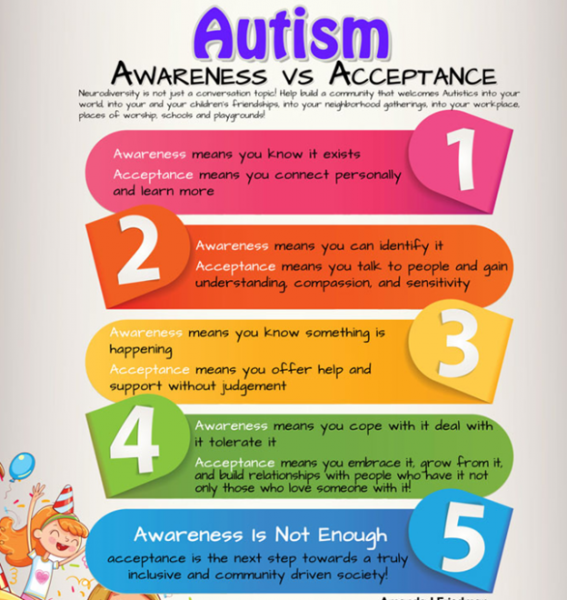
Autism Awareness, Autism Acceptance, and Neurodiversity – How does it all connect??
Here’s a quick run through of the evolution of a month-long movement to recognize and bring about change for some pretty amazing and diverse people in our communities.
In recent years, autistic voices have advocated that awareness is not enough and that awareness and acceptance are not the same thing. Awareness means you can “see” something but does not evoke any action toward what you see. To see the struggles of another human and not DO something is quite a paradox – imagine if an entire month was spent recognizing that people are hungry but doing nothing to address it? Most people would be shocked.
Fast forward almost 20 years and The Autism Society of America, along with leading disability organizations across the Country, are finally formally shifting reference to April as Autism Acceptance Month, ushering in what has been an important distinction with a call to action advocated by autistics for over a decade.
Eric Rozansky, an autistic blogger, recently wrote “What I think needs to replace it (Autism Awareness Month) is Autism Acceptance, because it’s one thing to be aware of autism and autistic people and their experiences and problems and what have you, and it’s another to actually accept and understand those things. I know all too well the experience of being looked at differently or as “lesser” because of my autism.”
In the past few years, there has been yet another shift in the movement to change how society references autistics and others who process and experience the world differently – not as groups of people with inflictions or disorders to be treated or cured – but as individuals who are part of a growing community of those whose neural pathways simply are wired differently. Simply stated, this group of people are now referred to as “neurodiverse”.
Neurodiverse or neurodivergent individuals encompass many different formal diagnoses including ADHD, dyslexia, dysgraphia, depression, anxiety, autism and more (see our previous articles to learn more about neurodiversity). The neurodiversity movement does not see neurodivergent people as needing to be cured or changed; instead, those who are neurodiverse want to be understood, embraced, accepted and included as they are.
At A Little Compassion Inc. and The Nest Coffee House, we have made a conscious choice to recognize April as Autism and Neurodiversity Acceptance Month to honor the voices of autistics and others who have expressed their desire to be referred to as neurodiverse.
We see you; we admire you, we need you to build with us an open, affirming and accepting community that enriches all our lives and makes our communities a better place for us all.
During the month of April, A Little Compassion has shared information about autism and neurodiversity with members of our community. Autism & Neurodiversity Acceptance Month has provided an important opportunity for all of us to strive to be better allies. So, how can you do that?
Click here to find strategies for how you can support members of our community in this insightful blog post by Meriah Nichols:
